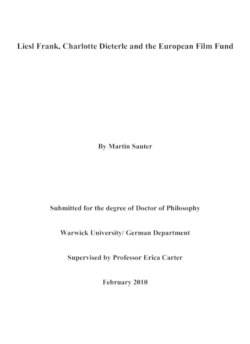Читать книгу Liesl Frank, Charlotte Dieterle and the European Film Fund - Martin Sauter - Страница 7
На сайте Литреса книга снята с продажи.
Autobiographies and Biographies
ОглавлениеThe publication of these early books and studies on exile was paralleled by a number of biographies and autobiographies of former émigrés that first began to appear over the course of the 1950s. They may have drawn attention to ‘the ca. 1, 500 film professionals to leave Germany after 1933 and Austria after 1938’(Horak 1986: 241) at a time when exile scholars were still largely preoccupied with the literary emigration. Most noteworthy are Leonhard Frank’s Links wo das Herz ist (Munich: Nymphenburger Verlagshandlung, 1952), Fritz Kortner’s Aller Tage Abend (Munich: Kindler, 1959), Friedrich Hollander’s Von Kopf bis Fuss (Munich: Kindler, 1959), Salka Viertel’s The Kindness of Strangers (New York/ NY: Holt, Rinehart & Winston, 1969), Lilli Palmer’s Dicke Lilli - gutes Kind (Zurich: Dromer Knaur Verlag, Scholler & Co., 1974), and Frederick Kohner’s The Magician of Sunset Boulevard - The Improbable Life of Paul Kohner, Hollywood Agent (Palos Verdes/ CA: Morgan Press, 1977). These (auto)biographies came at a time when the topic of exile was not widely discussed in the public domain. Hence, besides serving as a source for exile researchers to glean necessary information on émigrés and the Hollywood émigré community, these books raised awareness among the general public concerning the issue of exile. After all, prior to Lilli Palmer’s publication of her autobiography, who in Germany knew that she was forced to leave the country of her birth because she was Jewish?
In terms of its relevance for researchers, Viertel’s book was probably the most influential.
As one of the premier hostesses of Hollywood’s émigré community, this MGM screenwriter, Garbo confidante, and wife of director Berthold Viertel, had formidable access to various overlapping émigré circles. An actress turned screenwriter by profession, Viertel was politically left wing and an active member of the Hollywood Anti-Nazi League. Regular guests at her gatherings consisted of a motley mix of intellectuals, writers, directors and actors. Bertolt Brecht, Aldous Huxley, Christopher Isherwood, Garbo, Gottfried Reinhardt were all regular attendees (see: Isherwood 1997: 49, 62, 92). Her memoirs, which focus on the years between 1933 - 45, are candid and peppered with anecdotes and personal observations which made them a treasure trove for exile researchers at a time when primary and secondary sources, particularly those on film artists, were still relatively scarce. This is evidenced, for instance, in the publications of film critic John Russell Taylor (Strangers in Paradise, New York/ NY: Holt, Rinehart & Winston, 1983), or Anthony Heilbut, himself the son of German-Jewish refugees (Exiled in Paradise, New York/ NY: Viking Press, 1983), both of whom draw on The Kindness of Strangers. Of these however, Heilbut, Taylor, Viertel, and Kohner, make only more or less cursory mention of the EFF, conveying an inaccurate picture of the organisation which, if anything, contributed to promulgating the legend that surrounds it. However, even now, thirty years after its publication, Viertel’s book is often referred to, for instance, by Carola Stern in her biography of Liesl Frank’s mother, Fritzi Massary (Die Sache die man Liebe nennt, Berlin: Rowolth, 1998) and Diana McLellan in her examination of ‘Sapphic Hollywood’ (The Girls - Sappho Goes to Hollywood, New York/ NY: LA Weekly Books, 2000). As Viertel is central to McLellan’s book, McLellan relies heavily on The Kindness of Strangers, though she reveals details about Viertel’s life that Viertel herself either glossed over or chose to omit altogether, such as, for instance, her amorous relationship with Gottfried Reinhardt or her acquaintance with both Mercedes de Acosta and Marlene Dietrich. This underscores the limitations of autobiographical sources as they are often self-serving. Their point of view is wholly subjective and they are based on the author’s memory which, by nature, is unreliable. Thus, if autobiographies are used at all, they must ideally be backed up by empirical sources.
